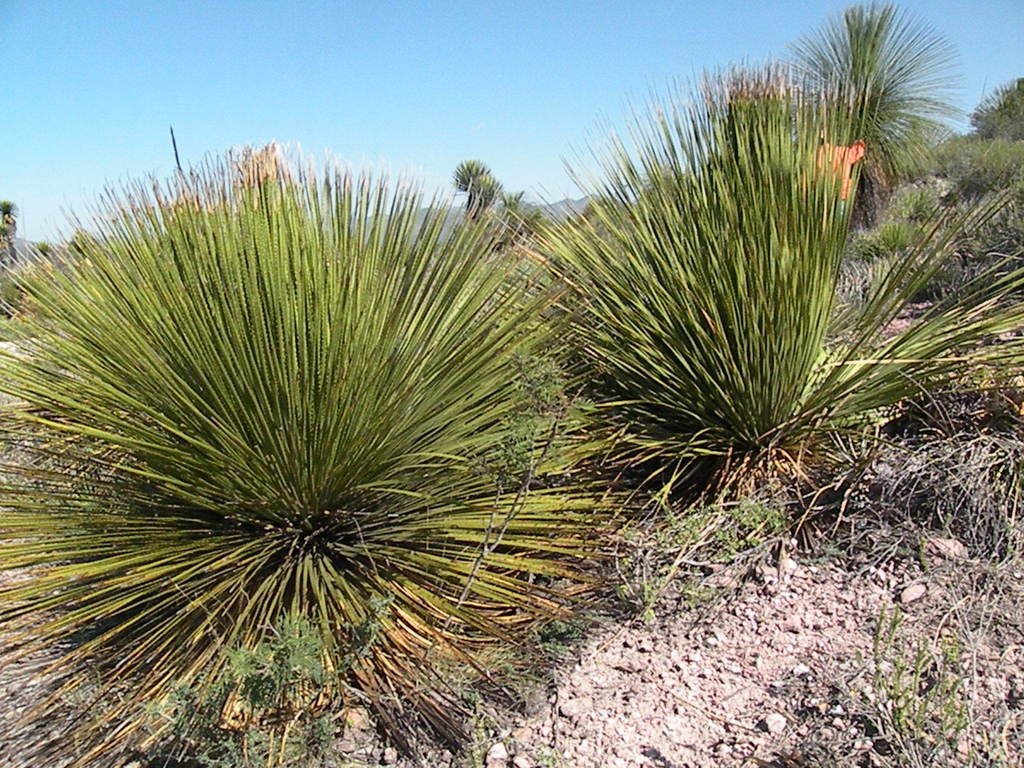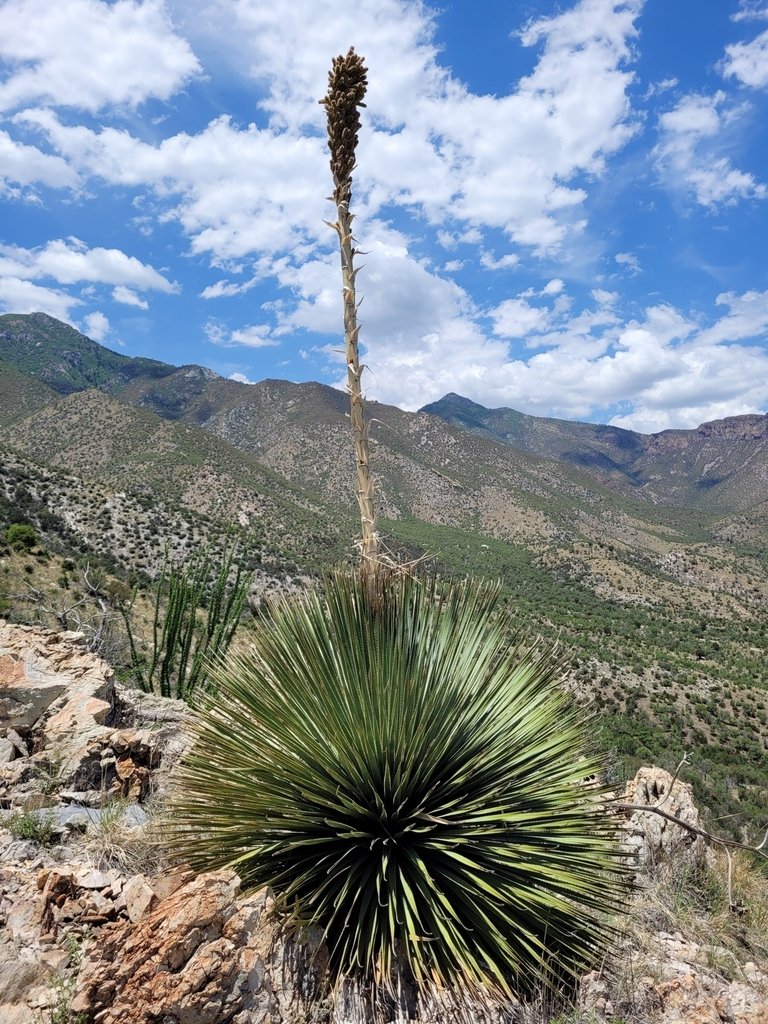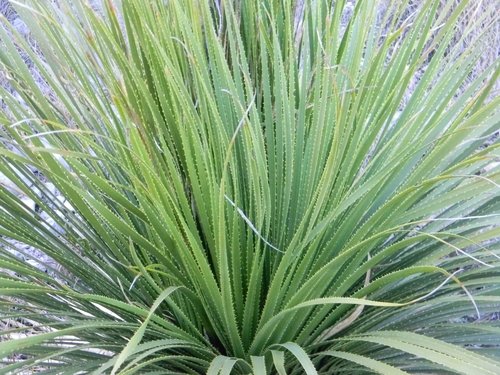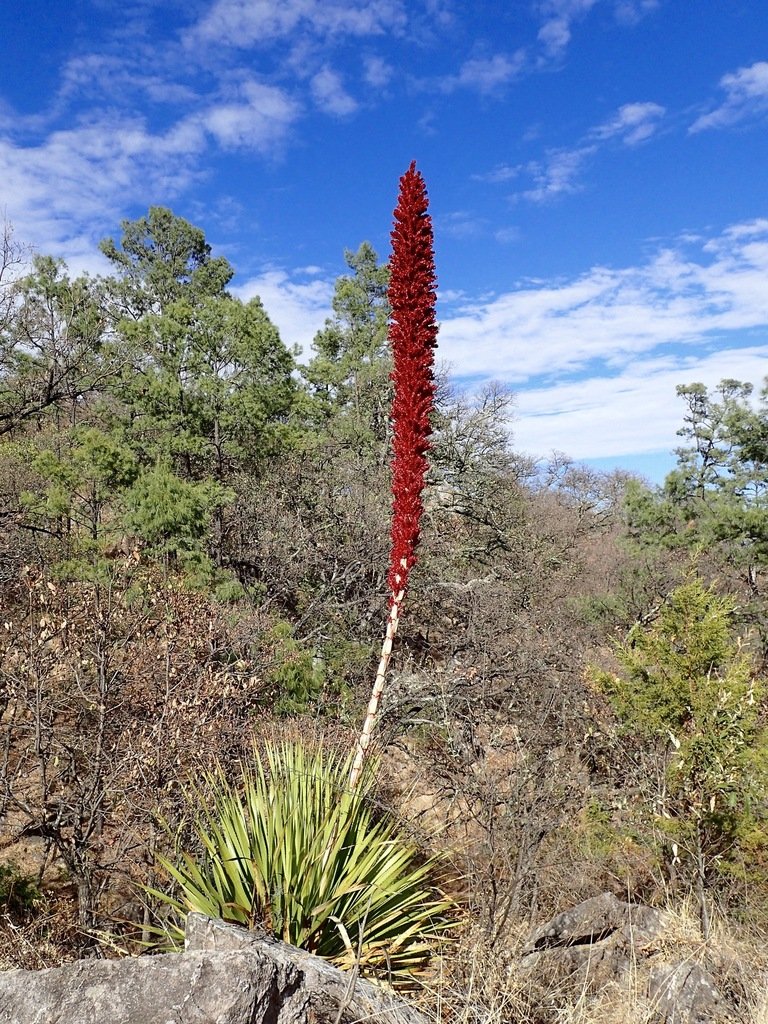The genus Dasylirion
Desert Spoon
Family: Asparagaceae
There are 23 species of desert spoons all native to Mexico and the American Southwest (Arizona, New Mexico, Texas). They are mostly very similar rosette-forming plants tolerant of full or even reflective sun, low water, and most are very cold hardy. Dasylirion are dioecious species, with the male and female flowers on separate plants.
All species of Dasylirion are tolerant of full or even reflective heat, low water (water once or twice a month in summer to keep healthy-looking), and relatively cold hardy, some species tolerating pretty extreme cold.
Dasylirion plants are pollinated by bees and moths, which are attracted to the nectar produced by the plant's flowers. They act as a larval host for the bird dropping moth (Ponometia erastrioides) and a yucca moth (Mesepiola specca). Many native bees, pupating caterillars, and other insects overwinter inside the thatch of desert spoons.
Photo of Dasylirion acrotrichum by Joaquín García, iNaturalist
The hearts of Dasylirion species are used for food, and in the production of sotol, a mescal-like liquor—the hearts of the plants are roasted, fermented and distilled. Plants are typically pit roasted which converts the starches into sugars. This material can then be eaten as food, or fermented into alcohol. The bloom stalks are also roasted and eaten.
The plants also are used to produce primitive fibers that are useful for various purposes, especially baskets, mats, clothing, etc. The old bloom stalks are used for various building materials as well.
The Great Desert Spoon (Dasylirion acrotrichum) is native to the Chihuahuan Desert and other xeric habitats in northern and central Mexico. The plants get about 6' tall (the blooms can get as tall as 15'). Hardy to 15°F. Photo by Elizabeth Torres Bahena, iNaturalist
The Blue Twister (Dasylirion berlandieri) is a dusty blue, wavy, evergreen foliage is about half the width of Dasylirion wheeleri, but the leaves are much longer, reaching over 5' in length. In 10 years, expect a 7' tall x 4' wide. Hardy to at least 5°F, probably even colder. It is naturally distributed in Mexico in Nuevo Leon, Tamaulipas and San Luis Potosi. Photo by Carlos G Velazco-Macias, iNaturalist
Smooth Sotol Dasylirion leiophyllum grows about 4-6' tall and wide. It occurs from southern Texas in the Rio Grande region north into New Mexico and south to central Chihuahua, Mexico. Hardy to 0°F. Photo by Jean Suplick, iNaturalist
Wheeler Sotol (Dasylirion wheeleri) is our Arizona native desert spoon. It is blueish and grows 4-6' tall and wide. Native to Arizona, New Mexico, Sonora and Chihuahua. Hardy to 0°F. Photo by billburg on iNaturalist
The Texas Sotol (Dasylirion texanum) is the second most common in the trade. It is native to central and southwestern Texas and in Coahuila state of northeastern Mexico, including the Chihuahuan Desert. Hardy to -20°F. Photo by Austin R. Kelly, iNaturalist
Gentry's Desert Spoon (Dasylirion gentryi) is interesting in that female plants have reddish fruits (before they turn brown). They grow 3-5' tall and wide. Native in the Sierra Madre Occidental in Sonora and Chihuahua. Hardy at least to 20°F, maybe lower.

Miquihuana Desert Spoon (Dasylirion miquihuanense) is an enormous plant that can get 8' tall (not counting the bloom). Native to the Sierra Madre oriental in eastern Mexico. Hardy to at least 15°F. Photo by Carlos G Velazco-Macias, iNaturalist
The Mexican Grass Tree (Dasylirion quadrangulatum) eventually forms a trunk, lending its common name. They get up to 10' tall (they take a long time to get that tall). The leaves are toothless. While both "Dasylirion longissimum" and "Dasylirion quadrangulatum" are often considered the same plant due to their similar appearance, the key difference lies in their flower stalks, with "Dasylirion longissimum" having a spindle-shaped flower spike that widens in the middle, while "Dasylirion quadrangulatum" has a more conical flower spike widest at the base; essentially, "longissimum" flowers later in the season with a different shape than "quadrangulatum" which flowers earlier and has a more tapered flower stalk, despite looking very similar vegetatively. Hardy to 20°F. Photo by dlardo on iNaturalist








